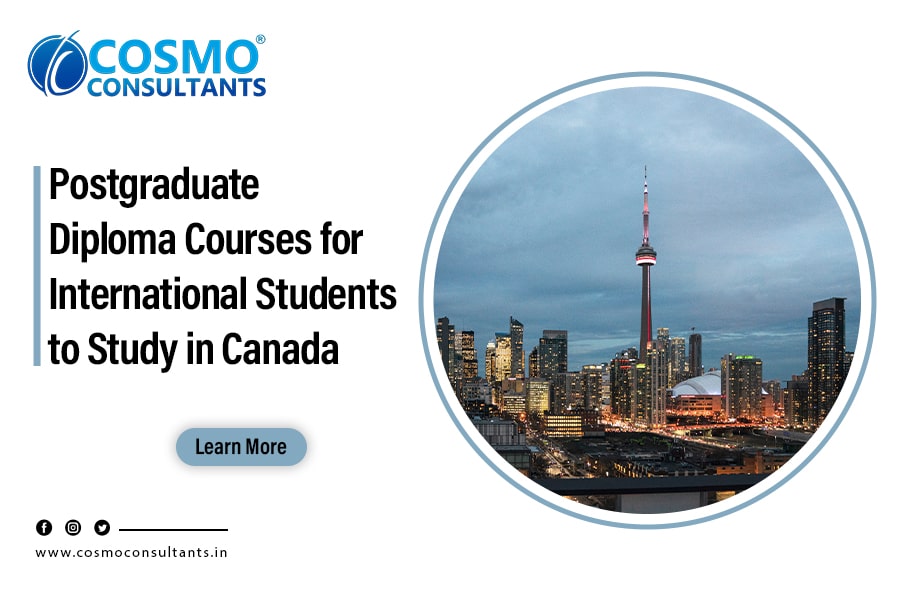
Post-degree diploma (PDD) programs are designed for students who have a bachelor’s degree and want to enhance and broaden their professional skills. These post-baccalaureate programs are valuable to domestic students who want to upgrade their qualifications and to international students who want to come to Canada and further their studies in a concentrated format. PG Diploma Courses in Canada are career-focused programs that give students practical experience in a particular industry. It is a condensed form of a postgraduate degree that is often provided at SPP and community colleges in Canada. The inexpensive cost and condensed course time of a postgraduate diploma in Canada have made it quite well-liked among foreign students.
A postgraduate diploma is a qualification that is typically one to two years in length. It is
designed to provide
students with specialized knowledge and skills in a particular field. Postgraduate diplomas are
typically offered by
universities and colleges, and they can be taken by students who already have a bachelor's
degree.
Graduate diplomas can be a valuable asset to students who are looking to advance their careers
or change careers.
They can also be a good way to prepare for a master's degree.
Postgraduate diplomas are advanced academic qualifications typically pursued by individuals who
have already
completed an undergraduate degree and wish to further specialize in a particular field or
subject area. These
diplomas are often shorter in duration and less extensive than master's degree programs,
making them a popular
choice for those seeking to acquire specialized knowledge and skills without committing to the
longer duration of a
master's program.
Postgraduate diploma programs typically offer a focused curriculum that includes coursework
relevant to the
chosen field of study. They can be found in various academic disciplines and professional
fields, including business,
healthcare, education, and more. While the specific requirements and duration can vary by
institution and
program, postgraduate diplomas are generally recognized as credible qualifications that can
enhance one's career
prospects or serve as a pathway to further academic pursuits. They offer a valuable opportunity
for individuals to
gain expertise in a specific area without the full commitment of a master's degree program.
The main difference between a postgraduate diploma and a master's degree is the level of
study and the depth of
knowledge and skills that are acquired. Postgraduate diplomas are typically one to two years in
length, while
master's degrees are typically two to three years in length. Postgraduate diplomas are
designed to provide students
with specialized knowledge and skills in a particular field, while master's degrees are
designed to provide students
with a more in-depth understanding of their chosen field and the ability to conduct independent
research.
Another difference between postgraduate diplomas and master's degrees is
the level of research required.
Postgraduate diplomas typically do not require students to complete a research project, while
master's degrees
typically do. This means that students who graduate with a master's degree have the skills
and experience
necessary to conduct independent research and contribute to their field of study.
Finally, postgraduate diplomas and master's degrees are typically awarded by different
institutions. Postgraduate
diplomas are typically awarded by universities and colleges, while master's degrees are
typically awarded by
universities.
Here is a table that summarizes the key differences between postgraduate diplomas and
master's degrees:
| Characteristic | Postgraduate Diploma | Master's Degree |
|---|---|---|
| Length of study | 1-2 years | 2-3 years |
| Level of study | Postgraduate | Postgraduate |
| Depth of knowledge and skills | Specialized | In-depth |
| Research required | No | YES |
| Institution awarding | Universities and colleges | Universities |
Which type of qualification is right for you depends on your individual needs and goals. If you are looking to gain specialized knowledge and skills in a particular field, a postgraduate diploma may be a good option for you. If you are looking to develop a deeper understanding of your chosen field and the ability to conduct independent research, a master's degree may be a better option for you. If you are unsure which type of qualification is right for you, it is a good idea to speak to a career advisor or study abroad consultant. They can help you to assess your needs and goals and choose the right qualification for you.
| Business Analytics | Data Science | Financial Planning |
| Project Management | Supply Chain Management | Marketing Management |
| International Business | Human Resources Management Agriculture | Information Technology Management |
| Nursing | Education | Accounting |
| Law | Psychology | Social Work |
| Architecture | Science | Business Law |
| Financial Analysis | Engineering | Global Banking and Economics |
| Hospitality Management | Information and Communication Technology | Professional Communication |
These programs are popular among international students because they offer specialized knowledge and skills that are in high demand in the Canadian job market. Additionally, Canada is a welcoming country with a strong economy and a high standard of living.
Canada has many excellent universities that offer postgraduate diploma programs. These programs can provide students with the skills and knowledge they need to advance their careers in a variety of fields. Here is the list of top Universities in Canada -
When choosing a postgraduate diploma program in Canada, it is important to consider your career goals and interests. You should also research the program's curriculum, faculty, and job placement rates.
Many private and independent colleges in Canada offer PG Diploma courses. Some of the top colleges in Canada for Post Graduate Diploma among international students are:
| College | Popular PG Diploma Programs | Duration |
|---|---|---|
| Durham College | Cyber security | 1 Year |
| Fanshawe College | Civil Engineering Technology | 3 Year |
| Niagara College | Computer Programming | 2 Year |
| St. Lawrence College | Health Care Administration | 1 Year |
| George Brown College | Management | 1 Year |
| Sheridan College | Chemical Engineering Technology | 2 Year |
| Seneca College | International Business Management | 8 months |
| St. Clair College | Business Administration - Finance | 1 Year |

The admission criteria, for PG Diploma programs in Canada, can differ based on the program and institution you are applying to. In this section, we will discuss the admission requirements for PG Diploma courses, in Canada.
Getting admission to a postgraduate diploma in Canada does not require international students to fulfill complex requirements. Some of the important eligibility requirements for pursuing PG Diploma courses in Canada are:
Canada's Post Graduate Diploma admissions procedure is quite flexible.
For admission to PG.Diploma Programmes in Canada, the following documents are needed:
International students who choose to pursue diploma courses in Canada can enjoy advantages.
Firstly these
programs are often more affordable and shorter, in duration compared to master's
degrees.
Additionally, Canada is renowned for its education system ensuring that students receive a
quality and rigorous
education through these diploma programs.
What’s more many of these programs provide work experience opportunities for students enabling
them to acquire
skills and practical knowledge that can greatly benefit their future job prospects upon
graduation.
Furthermore upon completing their diploma program in Canada international students may be
eligible for a
graduation work permit that allows them to work in the country for up to three years.
In summary, pursuing a diploma course, in Canada not only offers international students an
affordable and top-
notch education but also provides them with valuable work experience opportunities and the
chance to apply for a
post-graduation work permit.
